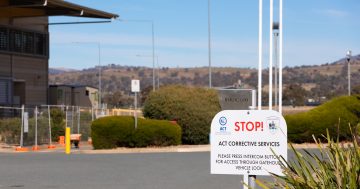
It’s currently not clear in AFP procedural documents that mental health issues are a reason for appointees to declare they feel they cannot operate a firearm safely. Photo: Claire Fenwicke.
CONTENT WARNING: This article mentions incidents of suicide.
The ACT coroner has urged the Australian Federal Police (AFP) to change its policies around employees having access to issued firearms when on leave following the deaths of three officers in Canberra.
Both Richard Paul Roberts and Samantha ‘Sam’ Baglin had served more than 20 years with the AFP when they used their issued firearms to take their own lives in the armoury at the AFP Headquarters in Barton in 2018.
Dominic Coleman had been an appointee of the AFP and an Air Security Officer (ASO) since 2016 and was on duty in Canberra when he took his life at the hotel he was staying at in 2019.
The AFP has a system where appointees are obliged to fill out a Change of Health Notification Form (COHNF) if they feel they are not or cannot operate a firearm safely due to issues such as major surgery.
This falls under the Commissioner’s Order on Operational Safety (CO3), which determines whether or not an AFP appointee has a valid operational safety qualification to carry their firearm.
While Mr Roberts, Ms Baglin and Mr Coleman had been dealing with poor mental health at the time of their deaths, only Ms Baglin’s issues were known to her supervisors.
Counsel assisting Coroner Archer submitted the COHNF system had several vulnerabilities, as it placed the onus on the AFP appointees to disclose the relevant information around their mental health.
“The disclosures that Richard and Dominic were required to make were not made. Clearly, they did not want the AFP to know,” Coroner Archer said.
“Richard, Sam and Dominic should have submitted a COHNF to disclose the mental health conditions present at the time of their deaths, but none of them did so.
“All of them appear to have intentionally avoided disclosing their mental health issues to the AFP.”
Coroner Archer recommended the AFP consider simplifying the circumstances in which a COHNF was required, and that it should be required whenever an AFP appointee is diagnosed with or treated for mental health issues.
He also recommended that AFP appointees should participate in any applicable regular mental health review processes as part of overall assessments of ensuring the safe use of force and firearms.
The issue of access to firearms was also examined, given Ms Baglin and Mr Roberts had been on leave when they took their own lives.
Ms Baglin had been stood down for welfare reasons due to severe psychological distress, while Mr Roberts had been deemed not physically well enough to be at work.
Coroner Archer noted the revocation of access to a firearm seemed to carry a “significant stigma” in the AFP, a consideration which had influenced the decision not to remove Ms Baglin’s gun.
Counsel assisting submitted it seemed “unnecessary” for managers to have to make further “judgement call[s]” on how likely an AFP appointee would self-harm to activate the steps to revoke her access to her firearm under CO3.
“If the AFP appointee should not be performing duties at work, there would seemingly be no useful operational purpose served by the appointee having access to a firearm,” it was submitted.
Counsel assisting suggested a new category under the CO3 to allow the temporary administrative and physical access to firearms “when it is known that the AFP appointee will not, or should not, be required to use it.”
“Being on leave (whether annual leave, long service leave, personal leave, parental leave or otherwise) fits obviously into such a category,” it was submitted.
The AFP opposed this suggestion.
“A broad prohibition on AFP members’ access to firearms while on leave would impose an additional administrative process to deploy AFP appointees,” the AFP’s legal counsel submitted.
However, they acknowledged the recommendation had the “potentially significant advantage” of normalising the removal of firearms across the AFP.
Coroner Archer rejected the AFP’s statements against the recommendation, stating normalising the removal of firearms would help “remove or reduce” the stigma around it.
“This shift in culture is an important step in improving gun safety within the AFP,” he said.
Following Ms Baglin and Mr Roberts’ deaths in 2018, the AFP took “urgent action” to implement enhanced armoury access control measures at all major sites.
This had not occurred in some smaller sites or where an AFP access-controlled armoury was located, including in Canberra.
“The AFP [ACT Policing] advised [it] … has not implemented enhanced access control measures to its armouries due to the existing firearms storage configuration across ACTP sites,” court documents noted.
“ACT Policing operates on a 24/7 small team environment which involves regular critical incident debriefing; close support and supervision of staff and 24/7 visibility.”
Coroner Archer also recommended the AFP consider ways in which existing paid leave entitlements be used for “situations in which supervisors or managers consider it necessary for an AFP appointee not to attend work due to concerns about wellbeing or fitness for work”.
If you have concerns about your mental health, contact Lifeline on 13 11 14. Contact Triple Zero (000) in an emergency.
AFP officers can access the SHIELD program for support.















